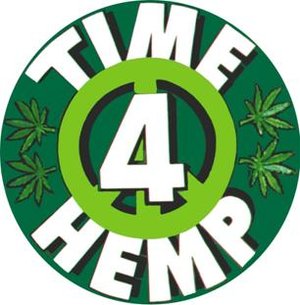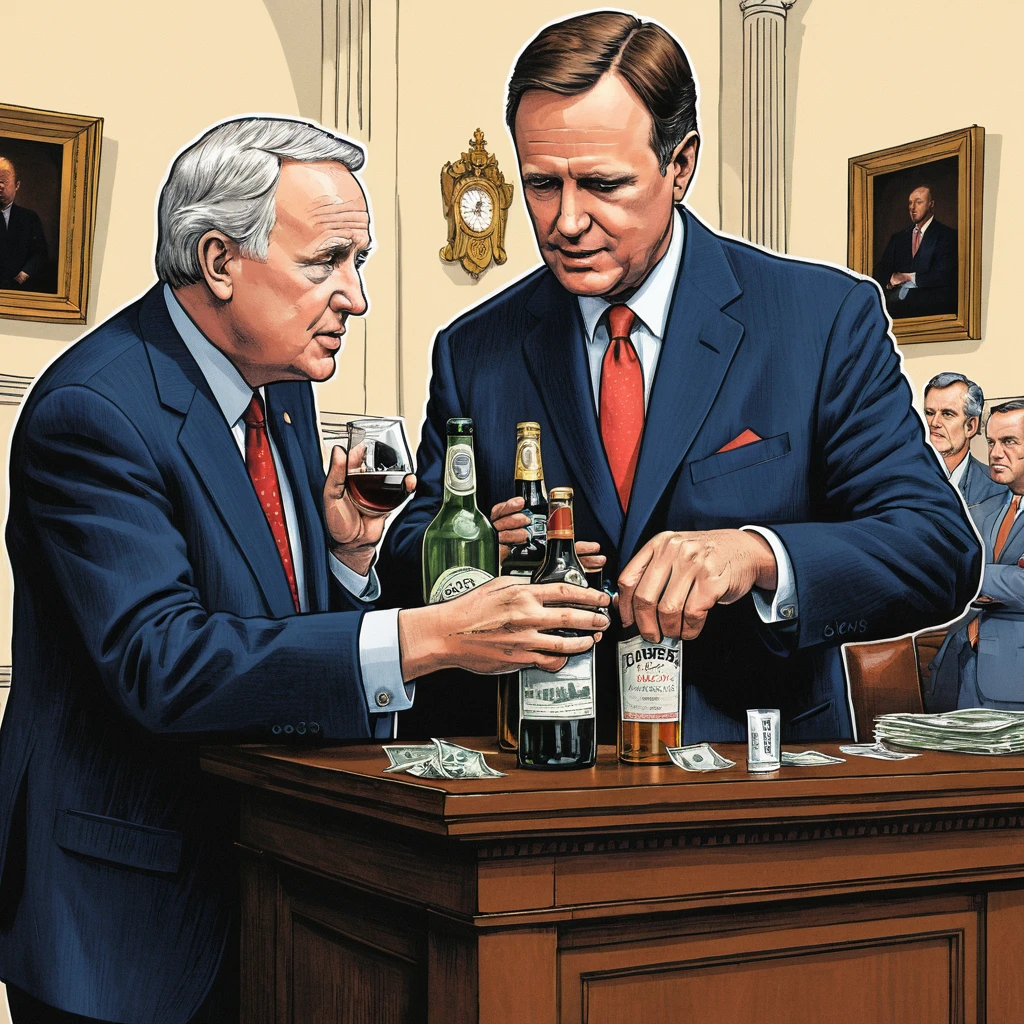Big Alcohol vs. Cannabis: Who’s Winning?
The lobbying industry spends over $4.1 billion every year to influence our legislation, and the result is that the voices of most Americans are drowned out by the voices of the few who can pay millions for lobbyists. This is how lobbying is ruining democracy.
Below is a FREE TO DOWNLOAD short PSA about how the Alcohol Industry lobbies to keep cannabis outlawed along with a great song by The Illusions Of Music.
Green Tide Rising
Inside the Alcohol Industry’s Lobbying Machine Against Cannabis
Written by Casper Leitch
Cannabis legalization is spreading from coast to coast as states are opening up to medical and recreational use. Behind the headlines, a powerful rival is quietly working to slow that momentum: the alcohol industry. With deep pockets, political clout, and strategic lobbying, alcohol companies are shaping cannabis laws to protect their profits and keep consumers from switching to cannabis.
At the heart of it all is simple economics: cannabis is a direct competitor. Studies show that in regions where cannabis is legalized, alcohol sales tend to drop, sometimes by as much as 15% in medical use states. Alcohol companies are keenly aware that cannabis acts as a substitute for beer, wine, and spirits. One market report from Bloomberg even calls cannabis a “significant threat” to the alcohol industry, noting that legal use is cutting into drink sales.
Lobbying For Control
Instead of letting this shift happen organically, booze corporations are intervening politically. The Wine & Spirits Wholesalers of America (WSWA) and the Distilled Spirits Council (DICUS) have petitioned Congress to impose strict federal rules on hemp-derived THC products like Delta-8 and Delta-10.
They argue for a regulatory system akin to alcohol: required licensing, age verification, potency limits, standardized labeling, and tight distribution rules. In essence, they’re saying; “These should only be sold where we already sell alcohol.”
Behind the polite veneer of public health concerns lies the power to exclude competition. The Beer Institute even suggested placing a federal excise tax on hemp and cannabis products higher than what’s placed on alcohol. That’s not just regulation, it’s a moat around their cash cow.
Meanwhile, other lobbying efforts include funding anti-legalization campaigns. For instance:
In Massachusetts, the National Beer Wholesalers Association (NBWA PAC) donated $25,000 to anti-marijuana campaign groups.
In Arizona, wine and spirits wholesalers gave $10,000 to oppose legalization initiatives.
The New Frontier: Hemp Drinks
The battle has evolved. THC-infused beverages (legally derived from hemp under the 2018 Farm Bill) are booming. Valued at over $1 billion (up from $239 million in 2023), they're expected to hit $30 billion by 2035. These products are everywhere (convenience stores, bars, even gas stations) appealing to health-conscious and sober-curious drinkers. With all the patchy regulations, they've become the new battleground.
In Texas, for instance, liquor distributors see hemp drinks as a growth opportunity and oppose a statewide THC ban, while beer distributors, worried about lost market share, support it.
Alcohol lobbyists often cloak their efforts in public safety arguments; concerns about underage access, advertising, or inconsistent regulations. Critics point out this sounds hollow, given the well-documented issues with alcohol: teen drinking, drunk driving, health harms and decades of poor compliance with age restrictions. One expert bluntly put it; “The alcohol industry has and always will support the prohibition against marijuana. They do not want people to have an alternative to booze.”
Which Politicians Are Being Supported by Big Alcohol?
Money tells part of the story. Campaign finance records show that alcohol industry PACs donate heavily to politicians across the country, many of whom are tied to current THC and cannabis debates.
Texas - Gov. Greg Abbott (R) and Lt. Gov. Dan Patrick (R) have both received significant donations from alcohol distributors while pushing or weighing bans on hemp-derived THC drinks. Reports describe beer distributors backing stricter bans, while liquor distributors, who see profit in hemp seltzers, oppose them.
At the federal level, members of the Texas delegation such as Rep. Jodey Arrington (R), Rep. Beth Van Duyne (R), Rep. Kay Granger (R), Rep. Henry Cuellar (D), and others received contributions from the Wine & Spirits Wholesalers of America PAC in recent cycles.
Massachusetts - In 2016, alcohol wholesalers gave thousands to the “No on 4” campaign to block legalization. The Beer Distributors’ PAC gave $25,000, while the Wine & Spirits Wholesalers also contributed. Voters legalized anyway.
Arizona - In 2016, the Arizona Wine & Spirits Wholesale Association donated $10,000 to fight Prop 205, the state’s legalization initiative. That campaign failed, but legalization passed in 2020.
Florida - In 2025, lawmakers debated SB-438, a bill to cap hemp THC levels and route beverages through alcohol wholesalers. Lobbyists tied to the alcohol industry were active in shaping the bill’s language.
Wisconsin - Cannabis remains illegal and hemp drinks are booming. Locals often point to the Tavern League as a force against legalization. While watchdog reports suggest other groups have taken the official opposition role, alcohol sector influence is still cited as a barrier.
At the federal level, three major PACs dominate alcohol lobbying. These PACs don’t always openly oppose legalization, but they lobby for regulations that funnel THC beverages through alcohol’s existing distribution system, limiting who gets to compete.
Wine & Spirits Wholesalers of America (WSWA PAC) gave $1.1M+ to candidates in the 2023–24 cycle.
Distilled Spirits Council (DISCUS PAC) spreads donations across Congress.
National Beer Wholesalers Association (NBWA PAC) long-time heavy hitter with strong distribution-side interests in every city of America.
Despite all this, the public tide is shifting. Cannabis acceptance is soaring, especially among younger generations, and some alcohol companies are adapting. Big names like Constellation Brands, Molson Coors, Heineken (via Lagunitas), and AB InBev have all invested in cannabis and hemp products or launched their own THC-infused beverages, especially in Canada.
Still, the dominance of traditional alcohol interests isn’t fading fast. In many states, hemp and THC products face tighter restrictions tailored to protect existing alcohol markets.
Why It All Matters
1. For policymakers: Understanding alcohol lobbying helps craft fair cannabis laws.
2. For cannabis businesses: Awareness means staying nimble in advocacy.
3. For consumers: Connecting the dots between policy, profit, and choice reveals who’s shaping the market.
This report isn’t just policy wonk territory, it’s about how big money protects its dominance and shapes the future of what people drink - or don’t. If this opened your eyes, share it with friends. Awareness is the first step toward change.
FAQ: How the Alcohol Industry Influences Cannabis Laws
Q: Does the alcohol industry lobby against cannabis legalization?
Yes. Alcohol companies view cannabis as a competitor and lobby politicians to slow legalization, impose strict regulations, or restrict THC products.
Q: Which politicians receive money from alcohol-industry PACs?
Campaign finance records show politicians across states receive donations from groups like the Wine & Spirits Wholesalers of America (WSWA PAC), Distilled Spirits Council (DISCUS PAC), and National Beer Wholesalers Association (NBWA PAC). In Texas, for example, Gov. Greg Abbott and Lt. Gov. Dan Patrick have received contributions amid debates over THC beverage bans.
Q: Are hemp-derived THC drinks legal in the US?
Hemp-derived THC drinks are federally legal if they contain less than 0.3% Delta-9 THC, but states can impose restrictions or bans. Regulation is evolving rapidly, with alcohol distributors often influencing state level rules.
Q: How does cannabis legalization affect alcohol sales?
Studies show alcohol sales can drop by up to 15% in states with medical or recreational cannabis, prompting some alcohol companies to fight legalization to protect their profits.
Q: Which states have seen alcohol lobbying impact cannabis or hemp laws?
Texas, Florida, Massachusetts, and Arizona have all seen alcohol-industry lobbying tied to cannabis or hemp regulations, including debates over THC beverage bans and distribution rules.
Q: Can cannabis businesses compete with Big Alcohol?
Yes, but competition is challenging. Alcohol companies push for regulations that favor their existing distribution networks, while cannabis businesses must navigate patchy, state-by-state rules and ongoing lobbying battles.
Q: How can consumers or advocates push back?
Awareness is key. Supporting pro-cannabis legislation, engaging in public comment periods, and sharing information about alcohol-industry influence can help create fairer policies.
Below is a FREE MUSIC DOWNLOAD about the highs and lows of the cannabis black-market by The Illusions Of Music.
Nightfall
Graham Elwood shows how the alcohol lobby wages war against the cannabis industry using the same tactics as all the other big corporations.



